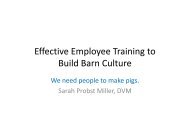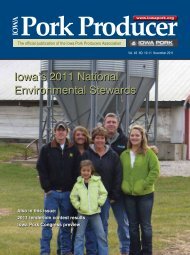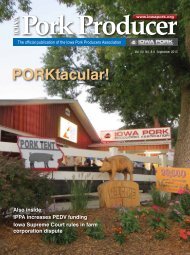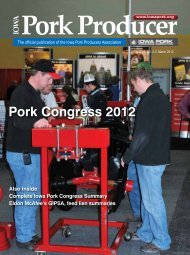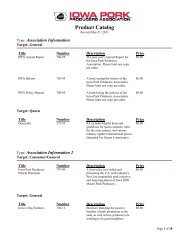Und - Iowa Pork Producers Association
Und - Iowa Pork Producers Association
Und - Iowa Pork Producers Association
Create successful ePaper yourself
Turn your PDF publications into a flip-book with our unique Google optimized e-Paper software.
UNDERSTANDING<br />
CONTRACTS AND LIENS<br />
IOWA PORK CONGRESS<br />
January 26, 2012<br />
Eldon McAfee<br />
Beving, Swanson & Forrest, P.C.<br />
Des Moines, <strong>Iowa</strong>
SWINE CONTRACTS –after 6/18/08<br />
• Packers & Stockyards requirements for<br />
production contracts:<br />
• Contract <strong>Producers</strong> -Right to Cancel<br />
• The later of 3 business days or any date<br />
stated in the contract<br />
• Contract must clearly disclose the right,<br />
the method and the deadline for<br />
cancelling<br />
• Additional Capital Investments<br />
• Disclosure statement on first page –<br />
additional large capital investments may<br />
be required, if not required, can disclose<br />
that none will be required<br />
2
SWINE CONTRACTS<br />
• Packers & Stockyards requirements:<br />
•Marketing & Production Contracts -<br />
Choice of Law and Venue<br />
•Legal forum located in the<br />
Federal judicial district in which<br />
the principal part of the<br />
production takes place<br />
•Contract may specify which state<br />
law applies, unless prohibited by<br />
state law<br />
3
LIVESTOCK & POULTRY<br />
CONTRACTS – after 6/18/08<br />
• Packers & Stockyards requirements:<br />
• All Livestock or Poultry Contracts –<br />
Arbitration<br />
•Any contract requiring arbitration<br />
must contain a provision allowing<br />
producer, before entering the<br />
contract, to decline to be bound by<br />
the arbitration provision<br />
•Contract must conspicuously<br />
disclose the producer’s right to<br />
decline<br />
• Also see final GIPSA rule<br />
4
CONTRACTS - GIPSA FINAL RULE<br />
• USDA Grain Inspection, Packers & Stockyards<br />
Administration (GIPSA)<br />
• Applies to contracts “entered into, amended,<br />
altered, modified, renewed or extended” after<br />
Feb. 7, 2012<br />
• Three areas of regulation in final rule:<br />
• Additional capital investments criteria<br />
(production contracts)<br />
• Reasonable period of time to remedy a<br />
breach of contract (production contracts)<br />
• Arbitration (production and marketing<br />
contracts)<br />
5
CONTRACTS - GIPSA FINAL RULE<br />
• The rules do not include all criteria<br />
GIPSA will look at to determine a<br />
violation<br />
•Rule states these are the criteria<br />
GIPSA may consider to determine<br />
a violation<br />
•Rule uses the term “including but<br />
not limited to” when listing the<br />
criteria GIPSA may consider<br />
6
DEFINITIONS<br />
Additional capital investment:<br />
• $12,500 or more per structure paid by<br />
grower over the life of the contract<br />
beyond the initial investment for<br />
growing and raising facilities, including<br />
cost of upgrades to structure and<br />
equipment and goods and professional<br />
services directly attributable to<br />
additional cap investment<br />
• Does not include maintenance or repair<br />
7
ADD’L CAP. INVEST. CRITERIA<br />
Criteria GIPSA may consider to<br />
determine whether a requirement<br />
that a grower must make add’l<br />
capital invest. over the life of the<br />
contract is a violation (including<br />
but not limited to):<br />
•Was grower given discretion to<br />
decide against add’l cap<br />
invesment<br />
8
ADD’L CAP. INVEST. CRITERIA<br />
• Was the add’l cap investment<br />
requirement result of coercion or<br />
retaliation, or threats of coercion or<br />
retaliation<br />
• Does other party to contract intend to<br />
reduce or substantially reduce or end<br />
production operations within 12<br />
months, absent a catastrophic or<br />
natural disaster or other emergency<br />
(bankruptcy)<br />
9
ADD’L CAP. INVEST. CRITERIA<br />
• Were some growers required to<br />
make additional cap investments<br />
while others similarly situated were<br />
not required to make the same<br />
investments<br />
• The age of and recent upgrades to<br />
grower’s operations<br />
• Can the cost of the investments be<br />
reasonably expected to be recouped<br />
10
ADD’L CAP. INVEST. CRITERIA<br />
•Was grower given a reasonable<br />
time period to implement the<br />
required investment<br />
•Equipment changes required for<br />
equipment previously approved<br />
and accepted if equipment is<br />
functioning as intended, unless<br />
grower is paid adequate<br />
compensation incentives<br />
11
REASONABLE PERIOD OF TIME TO<br />
REMEDY BREACH OF CONTRACT<br />
• Criteria GIPSA may consider to<br />
determine whether a grower has<br />
been given a reasonable period of<br />
time to remedy a breach of contract<br />
that could lead to contract<br />
termination (including but not limited<br />
to):<br />
•Was grower provided written notice<br />
of the breach upon initial discovery<br />
of the breach<br />
12
REASONABLE PERIOD OF TIME TO<br />
REMEDY BREACH OF CONTRACT<br />
•Did the notice of breach include:<br />
•a description of the act and the<br />
section of the contract breached<br />
•When the breach occurred<br />
•How the grower can remedy the<br />
breach<br />
•A date that provides a<br />
reasonable period of time to<br />
remedy the breach<br />
13
REASONABLE PERIOD OF TIME TO<br />
REMEDY BREACH OF CONTRACT<br />
•Did the other party take into<br />
account the grower’s ongoing<br />
responsibilities related to raising<br />
and handling swine under their<br />
care when setting the date to<br />
remedy a breach<br />
•Was grower given reasonable<br />
time after the notice of breach to<br />
rebut the alleged breach.<br />
14
ARBITRATION<br />
•Any marketing or production<br />
contract that requires arbitration<br />
must have the following clause<br />
on the signature page in bold,<br />
conspicuous print<br />
•If neither option is signed,<br />
arbitration will be deemed to<br />
have been declined<br />
15
ARBITRATION<br />
“Right to Decline Arbitration. A poultry grower, livestock producer or<br />
swine production contract grower has the right to decline to be<br />
bound by the arbitration provisions set forth in this agreement. A<br />
poultry grower, livestock producer or swine production contract<br />
grower shall indicate whether or not it desires to be bound by the<br />
arbitration provisions by signing one of the following statements;<br />
failure to choose an option will be treated as if the poultry grower,<br />
livestock producer or swine production contract grower declined to<br />
be bound by the arbitration provisions set forth in this Agreement:<br />
I decline to be bound by the arbitration provisions set forth in this<br />
Agreement ____________<br />
I accept the arbitration provisions as set forth in this<br />
Agreement____________”<br />
16
ARBITRATION<br />
Criteria GIPSA may consider to determine if<br />
grower or producer has meaningful opportunity<br />
to participate fully in arbitration process<br />
(including but not limited to):<br />
• Bold conspicuous printed clause describing<br />
the following so that grower or producer can<br />
make an informed decision on whether to elect<br />
arbitration:<br />
• who pays arbitration costs,<br />
• the arbitration process,<br />
• any limitations on legal rights and remedies<br />
so grower can decide whether to elect<br />
arbitration<br />
17
ARBITRATION<br />
• Are cost and time limits reasonable<br />
• Is there access to and opportunity to<br />
engage in reasonable discovery of<br />
information held by processor or<br />
contractor<br />
• Is arbitration used only to resolve<br />
disputes under the contract<br />
• Is a “reasoned, written opinion based<br />
on applicable law, legal principles and<br />
precedent” from the arbitrator required<br />
18
LIVESTOCK FEEDING<br />
CONTRACTS - INSURANCE<br />
• Standard farm liability policies do not<br />
normally cover a contract feeder’s<br />
liability for livestock death loss from the<br />
contract feeder’s negligence, etc. due to<br />
the “care, custody or control” policy<br />
exclusion<br />
• Policy endorsements are available to<br />
provide contract feeders with coverage<br />
for this exclusion<br />
• Coverage for this potential liability should<br />
be considered by all contract feeders<br />
19
LIVESTOCK FEEDING<br />
CONTRACTS - INSURANCE<br />
Nov. 23, 2011 <strong>Iowa</strong> Appeals Court – Boelman<br />
v. Grinnell Mutual<br />
• Boelmans purchased policy rider to cover<br />
custom feeding<br />
• Hogs fed under contract by Boelmans died<br />
from suffocation<br />
• Grinnell denied coverage based on other<br />
policy exclusions<br />
• Court found there was coverage noting<br />
Grinnell had “complete control over the<br />
language in the policy”<br />
20
LIVESTOCK FEEDING<br />
CONTRACTS - INSURANCE<br />
Boelman v. Grinnell Mutual<br />
“It was Grinnell Mutual’s duty to define any<br />
limitations or exclusionary clauses in clear and<br />
explicit terms. It could have clearly and explicitly<br />
stated in its custom feeding endorsement that,<br />
despite purchase of the endorsement, property<br />
damage to property in the insureds’ care,<br />
custody, or control, i.e., the pigs in this case, was<br />
not covered under Coverage A. It did not.<br />
Similarly, Grinnell Mutual could have clearly and<br />
explicitly stated in the endorsement that property<br />
damage arising out of “custom farming” was not<br />
covered under Coverage A-1. It did not.”<br />
21
LANDLORD’S LIEN<br />
• Landlords (farmland or livestock facility<br />
owners renting out land or facilities)<br />
• Landlord’s lien (first priority lien on<br />
crops and livestock)<br />
•Must file UCC-1 with Secretary of<br />
State within 20 days after tenant<br />
takes possession – (UCC-1 must<br />
include statement that it is filed to<br />
perfect a LL’s lien)<br />
22
LANDLORD’S LIEN<br />
• Also file in any state where livestock,<br />
crops, or other collateral subject to the<br />
lien will be moved<br />
• May file after the deadline dates, but<br />
won’t have first priority over previously<br />
filed UCC-1’s<br />
• This filing does not result in the<br />
landlord’s name on the grain or packer<br />
check unless other steps are taken<br />
23
IOWA CONTRACT GROWERS LIEN<br />
• Production contract lien (livestock or<br />
crops)<br />
• To have priority over prior filed UCC-<br />
1’s, must file a UCC-1:<br />
•Within 45 days after each group of<br />
livestock is delivered at the site; or<br />
•Within 180 days after livestock is<br />
delivered at the site if the livestock<br />
is delivered monthly or more<br />
frequently<br />
•In determining frequency of<br />
delivery, each site of a pig owner<br />
with multiple sites is considered<br />
separately<br />
24
IOWA CONTRACT GROWERS LIEN<br />
• Production contract lien (livestock or crops)<br />
• May file after the deadline dates, but won’t<br />
have first priority over previously filed UCC-<br />
1’s<br />
• Also file in any state where livestock or crop<br />
will be moved<br />
• This filing does not result in the contract<br />
feeder’s name on the packer check unless<br />
other steps are taken<br />
• Cash in hands of owner of livestock or crop<br />
are deemed by law to be proceeds from the<br />
sale of the livestock or crop<br />
25
IOWA AG SUPPLY DEALER LIEN<br />
• Feed, seed, chemicals, fertilizer<br />
• Lien on crops and livestock<br />
• File UCC-1 within 31 days of purchase<br />
• May file after these deadline dates, but<br />
won’t have priority over previously filed<br />
UCC-1’s<br />
• Lien in livestock feed has priority over<br />
earlier perfected lien or security interest<br />
for amount greater than acquisition<br />
price of livestock<br />
26
IOWA AG SUPPLY DEALER LIEN<br />
• Certified letter to secured parties –<br />
sufficient net worth or line of credit?<br />
• ASDL for feed: Letter to secured parties<br />
not required to have priority over earlier<br />
perfected lien or security interest<br />
• Other ASDLs (seed, chemicals, fert.):<br />
• Certified letter to secured parties required<br />
• Equal priority to prior perfected lien or<br />
security interest for<br />
27
IOWA AG SUPPLY DEALER LIEN<br />
•Also file in any state where<br />
livestock or crop will be moved<br />
•This filing does not result in the<br />
ag supply dealer’s (e.g., feed)<br />
name on the packer check<br />
unless other steps are taken<br />
28
IOWA AG SUPPLY DEALER LIEN<br />
• Dec. 30, 2011 <strong>Iowa</strong> Supreme Court –<br />
Oyens Feed v. Primebank<br />
• Feed dealer had priority over bank even<br />
though the dealer did not send certified<br />
letter<br />
• If certified letter requirement was meant to<br />
apply to feed liens, the law would be clear<br />
as it is for other ASDL liens<br />
• Court ruled not requiring letter made sense<br />
because feed is sold on an ongoing basis<br />
vs. seed, herbicides, & fertilizer<br />
• Bank still has priority for acquisition price of<br />
livestock<br />
29
IOWA VETERINARIANS LIEN<br />
• Lien for value of treating livestock, including<br />
products used, professional service rendered<br />
by the veterinarian<br />
• To have priority over prior filed UCC-1’s, must<br />
file a UCC-1 within 60 days of treating<br />
livestock<br />
• May file after the deadline dates, but won’t<br />
have first priority over previously filed UCC-1’s<br />
• Also file in any state where livestock will be<br />
moved<br />
• This filing does not result in the vet’s name on<br />
the packer check unless other steps are taken<br />
30
LIENS – LIVESTOCK OWNERS<br />
• Contractors (owners of livestock fed under<br />
contract)<br />
• Owners of livestock fed under contract by a<br />
contract feeder should consider filing a<br />
UCC-1 as a “protective filing” to provide<br />
notice to lien holders and others that the<br />
livestock are owned by the Contractor and<br />
not the contract feeder<br />
31
LIENS<br />
Termination<br />
•Must terminate by filing<br />
termination statement within 20<br />
days after written notification<br />
from party named in lien, if<br />
obligations have been paid<br />
•Good policy to terminate lien<br />
once obligations have been paid<br />
even if written notification is not<br />
received from other party<br />
32
LIENS<br />
Products sold - first priority for payment<br />
• Sales of livestock and grain<br />
• If Seller is not paid by buyer, seller<br />
most often loses priority in<br />
livestock/proceeds to buyer’s<br />
secured lender (exceptions include<br />
Packers & Stockyards Act & <strong>Iowa</strong><br />
Grain Indemnity Fund transactions<br />
(stored & cash sale grain – credit<br />
sale transactions not covered by<br />
Fund))<br />
33
LIENS<br />
Products sold - first priority for payment<br />
• Options for seller:<br />
• Obtain first priority UCC security interest in<br />
pigs in sales contract & get subordination<br />
agreement from buyer’s secured creditor<br />
• Obtain UCC security interest in pigs in sales<br />
contract and follow <strong>Iowa</strong> Code requirements<br />
to obtain a first priority “purchase money<br />
security interest” (primarily, this involves<br />
filing a UCC-1 and notifying buyer’s secured<br />
creditor before the livestock is delivered)<br />
• Letter of credit from buyer’s lender<br />
34
ENTERING INTO OR<br />
MODIFYING A CONTRACT<br />
• Read and understand before signing<br />
• Know what is required of you<br />
• Know the other party’s financial and<br />
other business history<br />
• If it is in the contract, you must do it<br />
• If it isn’t in the contract, it isn’t part of<br />
the agreement<br />
• Any amendments to the contract must<br />
be in writing and attached to the<br />
contract<br />
35
ENTERING INTO OR<br />
MODIFYING A CONTRACT<br />
• Oral agreements are binding (in most cases)<br />
• More difficult to prove<br />
• Hard to remember what the agreement was<br />
• Written agreements<br />
• Most often have a provision which states<br />
that the written agreement supersedes all<br />
previous oral agreements<br />
• Most often have a provision which states<br />
that any changes to the written agreement<br />
must be in writing<br />
36
ENTERING INTO OR<br />
MODIFYING A CONTRACT<br />
• Everything is negotiable, including<br />
whether to sign the contract<br />
• Discuss all provisions of the proposed<br />
agreement with the other party<br />
• Have the proposed agreement<br />
reviewed by consultants and legal<br />
advisors<br />
• Even if the other party will not change a<br />
term –at least know their interpretation<br />
• Make it clear that there is no contract<br />
until everything is in writing and signed<br />
by all parties<br />
37
CONTRACT DEFAULT<br />
• Communicate with the other party<br />
• If contract requirements cannot be<br />
fulfilled, let the other party know in<br />
advance and try to negotiate a<br />
resolution<br />
• Know legal options before negotiation<br />
• If negotiation doesn’t work, ready to<br />
use legal options<br />
• Don’t give up on negotiation, even after<br />
legal process started<br />
38
CONTRACT DEFAULT<br />
• Force majeure (impossibility of<br />
performance)<br />
• Fire, storm, government intervention,<br />
etc.<br />
• In most swine contracts, market<br />
forces and disease are excluded<br />
• Government regulation?<br />
• Price of feed inputs?<br />
• Can’t get financing?<br />
• Basic legal standard: Economically<br />
burdensome is usually not enough<br />
39
CONTRACT DEFAULT<br />
• Will other party default?<br />
• Demand the other party provide<br />
written assurance that they can<br />
perform under the contract (adequate<br />
assurance of performance)<br />
• If not provided within a reasonable<br />
time, not to exceed 30 days, then the<br />
party demanding the assurance of<br />
performance may terminate the<br />
contract<br />
40
CONTRACT DEFAULT<br />
• Right to rebut (GIPSA rule) cure any default<br />
• Right to correct other party’s default<br />
• Mediation required by <strong>Iowa</strong> law for livestock<br />
care and feeding contracts<br />
• Arbitration required by contract?<br />
• Which state’s law applies? Where will court<br />
action or arbitration be held?<br />
• Mitigation of damages required<br />
• Damages<br />
• Money<br />
• Specific performance – court orders<br />
defaulting party to perform – rare<br />
41
CONTRACT DEFAULT<br />
• Pig purchase agreement - damages for<br />
default<br />
• Difference in sales price, plus expenses of<br />
sale<br />
• Sale after default must be in a commercially<br />
reasonable manner – notify defaulting buyer<br />
before sale to new buyer<br />
• File lawsuit for damages<br />
42
CONTRACT DEFAULT<br />
• Termination of contract<br />
• Only if default is material: a substantial part of the<br />
contract or if the default substantially defeats the<br />
purpose of a contract<br />
• Default must be total (a material default which is<br />
not cured within a reasonable amount of time<br />
after notice to the other party or a material default<br />
which cannot be cured)<br />
• If a party terminates a contract for less than a<br />
total default, the terminating party is in default of<br />
the contract<br />
• Does the terminating party stand to gain<br />
economically by terminating the contract?<br />
43
CONTRACT DEFAULT<br />
• Termination of contract<br />
• In general, under a pig purchase<br />
agreement, a buyer’s failure to pay<br />
for one group of pigs in a multi-group<br />
contract is not sufficient legal basis<br />
for a seller to terminate the contract<br />
• Likewise, in general, under a<br />
production contract, missing one<br />
payment is not sufficient legal basis<br />
for the contract feeder to terminate<br />
the contract<br />
44




